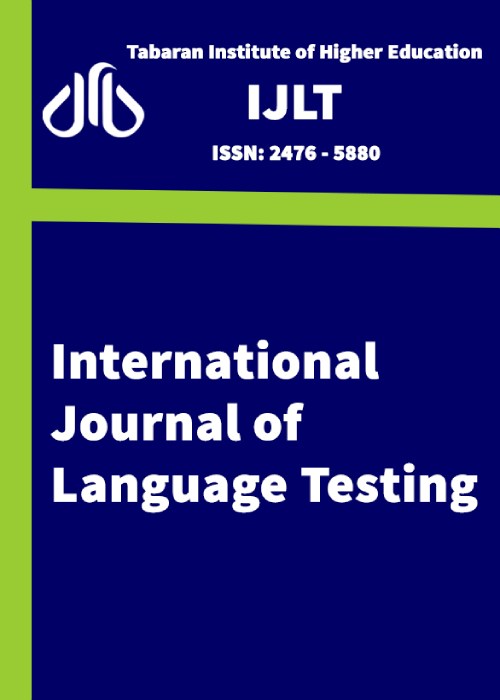فهرست مطالب

International Journal of Language Testing
Volume:12 Issue: 1, Mar 2022
- تاریخ انتشار: 1401/05/09
- تعداد عناوین: 4
-
Pages 1-25Assessment literacy refers to the knowledge teachers have about definitions of testing and the employment of this knowledge to classroom practices. This study inspected the extent to which high school teachers of English, mathematics, science, and social studies utilize assessment literacy and instructional improvement practices in their classrooms and the probable relationship between these two factors. To this end, ninety-seven teachers from sixty high schools across Zanjan province in Iran were selected based on convenient sampling. The instrument used was a 32-item questionnaire designed by researchers and validated by experts. A confirmatory factor analysis (CFA) was also conducted in order to validate the factor structure of the questionnaire. The results showed a strong positive relationship between assessment literacy and instructional improvement practices in all four subject areas through correlations. This suggests that showing an understanding of assessment literacy results in a greater understanding of instructional improvement in the classroom. Moreover, a one-way ANOVA was performed in order to determine if there is a significant difference in the use of assessment literacy practices and instructional improvement among different subject areas. The data revealed no statistically significant differences between neither assessment literacy nor instructional improvement scores by subject area. The study can be beneficial to school districts and teachers since the review of existing teaching practices and an increase in ongoing professional development in assessment literacy theories and practices may improve instructional improvement in all subject areas.Keywords: assessment literacy, Instructional improvement, Correlation, One-way ANOVA, Confirmatory factor analysis (CFA)
-
Pages 26-58Combining Bachman’s (1990) conceptualization of content validity with Messick’s (1989) unifying model of construct validity, this study attempted to fill the gap in researching content validation in the context of a university reading achievement test by (a) examining traditional content validity evidence and (b) analyzing the test scores to either back-up or rebut the evidence and explore the construct of the underlying test structure. On a sample of 477 third-year English-majored test takers at a Central Vietnamese University (CVU), the study was conducted in the pre-test stage where the test content was compared with the test specification and the post-test stage where the test scores were processed via Rasch and CFA competing model analyses. Results showed that while content relevance was satisfactory and the test construct was to a large extent not threatened by construct-irrelevant variance, content coverage of the test remained problematic with instances of construct underrepresentation. Moreover, the study supported the one-factor model of general reading ability as the underlying structure of the reading achievement test over the correlated three sub-skill and higher-order factor models. The study bears implications for both test writers in designing and test takers in performing the L2 reading test.Keywords: content validity, Reading construct, One-factor model, Reading achievement test, English majors
-
Pages 59-81The measurement of test-taking strategies and practices, mostly studied through qualitative methods, has been an important aspect of language testing and assessment research. The current study examines the test-taking strategies of International English Language Testing System (IELTS) test-takers and reports the process of designing and validating an IELTS test-taking strategy questionnaire. To achieve this aim, a questionnaire with 62 items was developed and piloted on 534 IELTS test-takers. To ensure its validity, the questionnaire results were analyzed through Exploratory and Confirmatory Factor Analyses (EFA and CFA). The final 49-item instrument with eight factors, “test-management (TM)” and “test-wiseness (TW)” strategies in each skill, had adequate psychometric properties. The findings revealed positive correlations between TM and TW strategies, representing strong correlations between Reading TM and Listening TM, Reading TW and Listening TW, and Listening TM and Speaking TM. The developed questionnaire can serve as a diagnostic tool to monitor test-takers’ performance and strategies, mainly in high-stakes tests like IELTS.Keywords: Factor analysis, questionnaire design, Test-management strategy, Test-wiseness strategy, Validation
-
Pages 82-102
The contemporary era of learning-oriented assessment demands for teacher professional efforts to appropriately and accurately assess learners' attainment and use the assessment results for the enhancement of learning. In second/foreign language (L2) teaching discipline, this has recently brought language assessment literacy (LAL) to the forefront, with an increasing emphasis on teachers' professionalism of this concept. Given this, L2 teachers' mastery of practical and technical skills, as prescribed by the exiting LAL models, could not be entirely complete nor enhanced without their conceptions of assessment and beliefs system. To illuminate these dimensions, the present study aimed to develop and validate a LAL scale which could have relevance to L2 localized contexts. Exploratory and confirmatory analyses of data from a sample of L2 teachers (N=213) provided empirical evidence supporting the utility and validity of the scale. The paper concludes with the importance of teachers' conceptions of LAL and implications of the findings.
Keywords: Teacher Professionalism, Teacher Knowledge, Language Assessment Literacy, Attitudinal, Beliefs Dimensions


